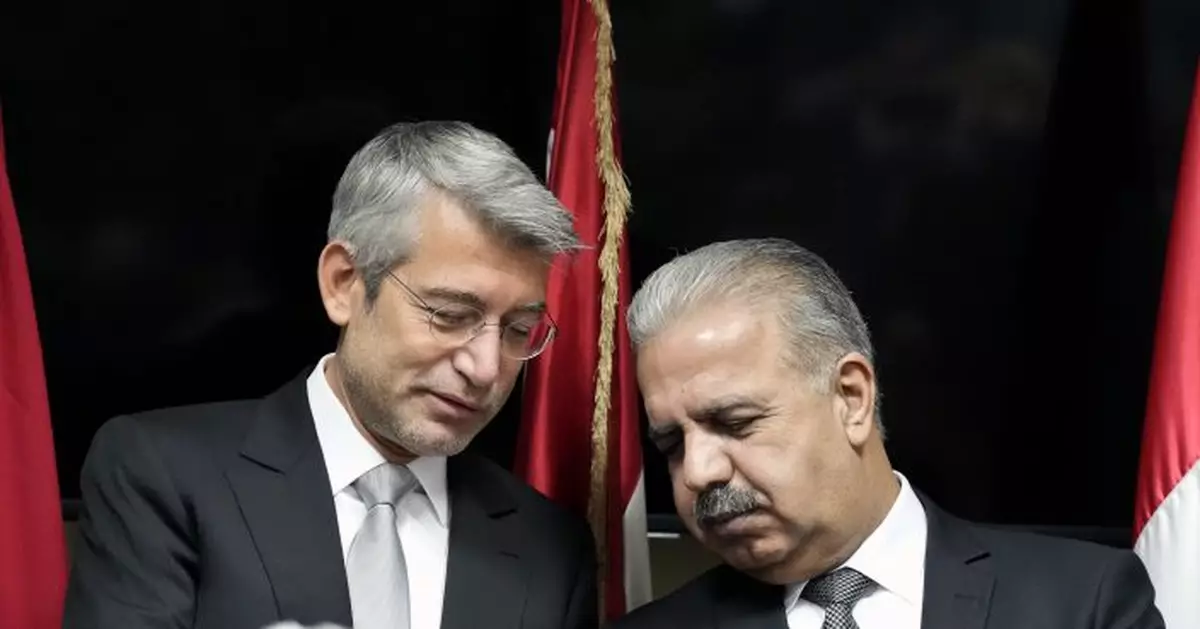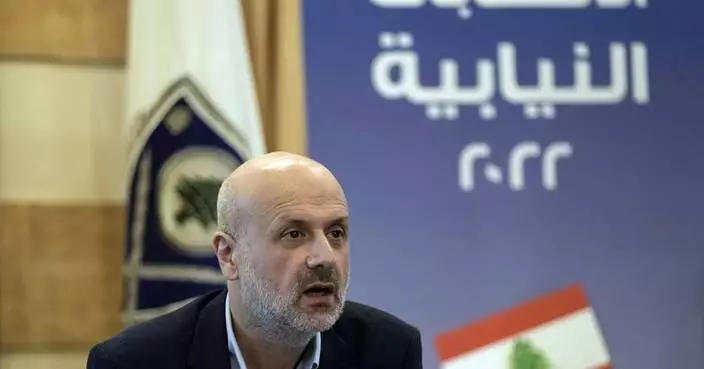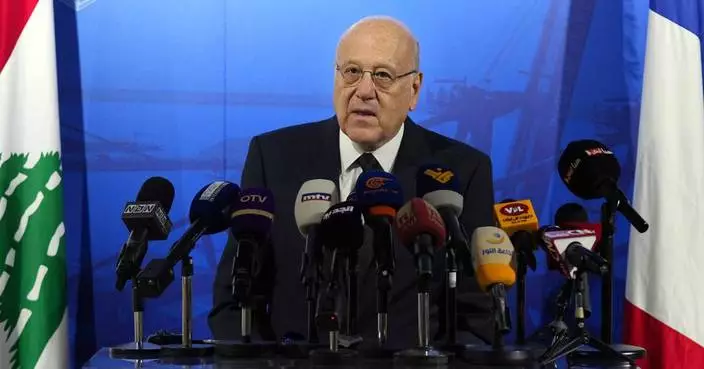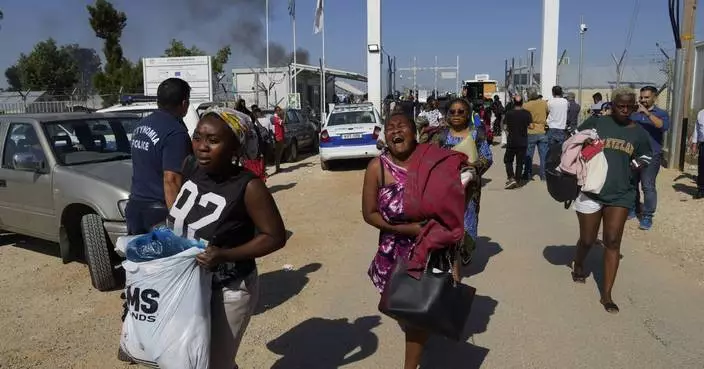Lebanon signed deals on Wednesday to purchase electricity from Jordan via Syria to help the small Mediterranean country deal with its crippling energy crisis.
The deals are expected to bring Lebanon up to 250 megawatts of electricity a day within two months, enough for about two hours of power a day. The electricity will be transmitted through Syria. The World Bank is expected to finance the deals, and negotiations are underway.
Lebanon’s Energy Minister Walid Fayyad said he expects financing negotiations to conclude in two months.
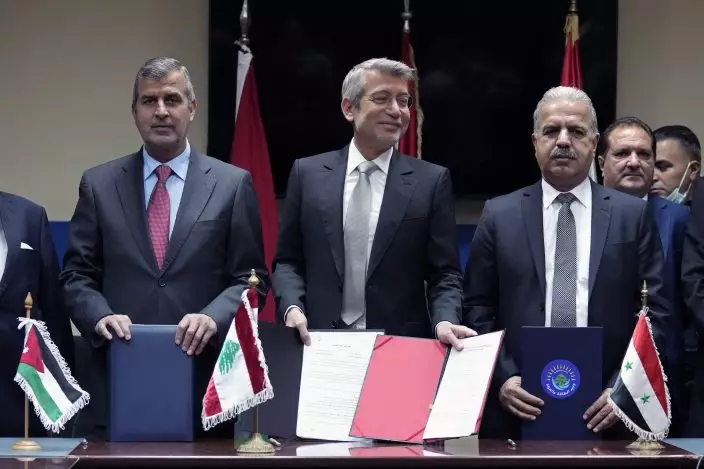
Lebanon's Energy Minister Walid Fayyad, center, Jordanian Energy Minister Saleh Kharabsheh, left, and Syria's Electricity Minister Ghassan al-Zamil, pose for a photograph after they sign deals to bring electricity from Jordan through Syria to Lebanon, at the Ministry of Energy and Water in Beirut, Lebanon, Wednesday, Jan. 26, 2022. Lebanon's electricity company offers only a couple of hours of power a day, and residents have heavily relied on costly and polluting private generators since the end of the civil war in 1990. (AP PhotoBilal Hussein)
“After signing today, we are left with the financing through the World Bank, something I will work on as soon as possible. The details will be clear in the next two months,” Fayyad told reporters during the signing ceremony. ”We don’t want to promise the Lebanese people that as soon as we sign electricity will come.”
Despite various U.S sanctions on Syria, Washington has endorsed different deals to help Lebanon handle its energy crisis. It has offered reassurances to Lebanon and waivers from sanctions to companies sending gas and electricity through Syria. But there has been some push back from Congress against offering what seems to be a relief for the government of Syrian President Bashar Assad.
The energy crunch is at the heart of Lebanon’s snowballing economic crisis, described as one of the world’s worst since the 1850s. A massive public deficit and a crashing national currency have made shortages perennial amid continuously soaring prices.
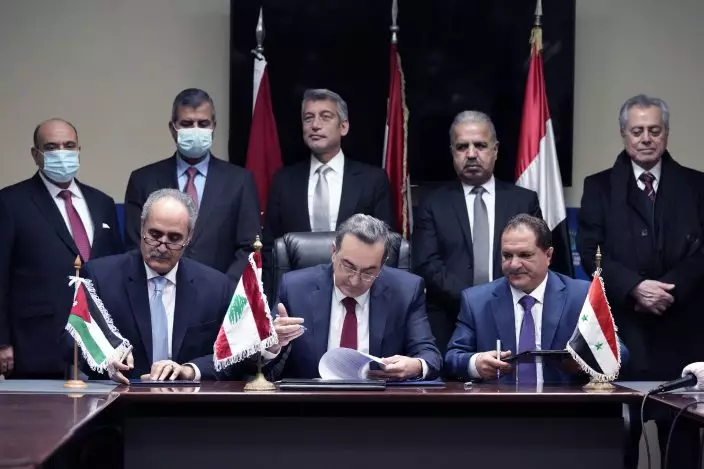
Front row from left to right, wldAmjad Rawashdeh, the Managing General Director of the Jordanian National Electric Power Company, Kamal Hayek, the Director of Electricity of Lebanon, and Fawaz al-Zaher, General Manager of Syrian Electricity Transmission and Distribution, sign deals to bring electricity from Jordan through Syria to Lebanon, at the Ministry of Energy and Water in Beirut, Lebanon, Wednesday, Jan. 26, 2022. Lebanon's electricity company offers only a couple of hours of power a day, and residents have heavily relied on costly and polluting private generators since the end of the civil war in 1990. (AP PhotoBilal Hussein)
Lebanon’s electricity company offers only a couple of hours of power a day, and residents have heavily relied on costly and polluting private generators. The aging national grid has not been able to provide 24-hour electricity in the country since the end of the civil war in 1990, and fuel oil subsidies for the state electricity company have been the main driver of the country's massive national debt.
Shortages of medicine, fuel and basic supplies have often brought the country to standstill and driven more than half of the population deep into poverty. Political disagreements have delayed efforts to form a government to negotiate a rescue package with international financial institutions. The government is currently negotiating a draft budget.
Fayyad praised what he described as speedy Arab cooperation that has enabled the transmission of electricity in two rather than six months.
Jordanian Energy Minister Saleh Kharabsheh said the agreement with Lebanon reinforces cooperation between the neighboring countries and comes at a “critical time for Lebanon.” He called it a deal to help Lebanon, and not a “commercial deal” — suggesting it is only covering its cost.
“This is not only to the benefit of Lebanon but in the interest of all. Any cooperation between Arab countries is an interest for all,” Kharabsheh said.
Lebanon has also negotiated receiving Egyptian natural gas, set to be transmitted through Jordan and Syria. Another deal with Iraq helps it secure fuel for its power plants.
Speaking in Beirut after the signing ceremony, Syria's Energy Minister Ghassan al-Zamil said the U.S. sanctions, known as the Caesar act, are of no concern to his government.
“It is imposed by a country. It is not a law,” he told reporters. “What concerns us in this deal, despite the Syrian government putting up with a lot of expenses to fix the pipelines which were not a priority for the government or the electricity ministry, is the insistence of the government to offer more to support Arab cooperation.”
Syria's government has been largely boycotted by its Arab neighbors since the start of the war in that country in 2011. Most countries blamed Assad's government for the war's atrocities. But as the war dies down and Assad remains in power, many Arab neighbors have began reconsidering their ties with Damascus, re-opening their embassies and exchanging visits.
BEIT MERI, Lebanon (AP) — Lebanon’s interior minister alleged Wednesday that the mysterious abduction and killing of a Hezbollah-linked Lebanese currency exchanger in a villa on the edge of a quiet mountain resort town earlier this month was likely the work of Israeli intelligence operatives.
The killing of Mohammad Srour, 57, who was sanctioned by the U.S., was like something out of an international spy thriller. Pistols equipped with silencers and gloves were found in a bucket of water at the scene, along with chemicals apparently intended to remove fingerprints and other evidence, Interior Minister Bassam Mawlawi said in an interview with The Associated Press. Thousand of dollars in cash were left scattered around Srour’s body, as if to dispel any speculation that robbery was the motive.
“Lebanese security agencies have suspicion or accusations that Mossad was behind this operation,” Mawlawi said, referring to the Israeli spy agency. “The way the crime was carried out led to this suspicion.”
He provided no specific evidence for his allegations. Mawlawi said the investigation is still ongoing and once it's over, the results will be made public and referred to judicial authorities.
The Israeli prime minister’s office, which oversees Mossad, did not immediately respond to a request for comment.
The suspicion by Lebanon’s security agencies that the crime could be the work of Israeli agents comes at a time when Lebanon’s southern border region has been rocked by ongoing clashes between militants of the Hamas-allied Hezbollah group and Israeli troops.
The U.S. Treasury sanctioned Srour in 2019 over his alleged money transfers from Iran through Hezbollah to the Palestinian militant group Hamas in the Gaza Strip.
“Mohammad Srour’s activity in money exchange is known, as are the transfers of money from which side to which side,” Mawlawi said.
Srour’s killing earlier this month, came as U.S. and Israeli officials have been trying to crack down on transfers of funds to Hamas. The push has intensified following the Oct. 7 Hamas-led attack on southern Israel that triggered the devastating war in Gaza and its ripple effects around the region.
Last month, a senior U.S. Treasury official visiting Beirut pressed Lebanese authorities to prevent funds from being funneled to Hamas through the tiny country. Jesse Baker, deputy assistant secretary of the Treasury for Asia and the Middle East in the Office of Terrorist Financing and Financial Crimes, met with top Lebanese political and financial officials.
Israel's military said it has killed a number of money exchangers in Gaza for allegedly funding Hamas.
Srour’s killing was clearly planned in advance. Three Lebanese judicial officials familiar with the investigation told the AP that a man posing as a customer had contacted Srour from abroad and asked him to deliver a cash transfer to a woman in the mountain resort of Beit Meri.
The officials, who spoke on condition of anonymity because the investigation is ongoing, said Srour first went with his nephew and left after handing the woman the money. He was contacted by the same person with another request a day after his first visit, the officials said. This time he went alone, after which his family lost contact with him.
Mawlawi said the cellphone the woman used to get in touch with Srour was only activated to contact him.
He said the perpetrators had first tried to rent an apartment in Beirut’s southeastern suburb of Hazmieh, a detail that has not been previously reported, but they later canceled, apparently because “they did not find (the apartment) suitable to carry out the operation."
Mawlawi said the killers then shifted to the quiet town of Beit Meri, famous for its posh homes with red-brick roofs, sprawling forest and Roman-era archaeological site, where they rented a three-story villa on the edge of the town using fake Lebanese identity cards. The General Security Directorate is looking into the identities of people who entered and left the country around the period of the killing, he said.
Srour went missing on April 3 in Beit Meri, and his body was found a week later in the villa. Mawlawi said investigators found “a large number of bullet” wounds in different parts of his body, including his arms and legs. He was reportedly handcuffed.
The villa is located on a quiet side street lush with trees.
“We did not hear anything,” said Christian Francis, who lives across the street from the villa where Srour was killed. He added that most people in the highly secured area have dogs, while municipal police have a checkpoint nearby and the Lebanese army has a post few hundred meters (yards) away.
Beit Meri’s mayor, Roy Abou Chedid, told the AP that the apartment was rented in late February to an unknown person for one year for $48,000. He added that the family that owns the villa did not register the rental contract at the municipality but had paid its municipal taxes on time in November.
“The operation was carried out in a way that is more than professional,” Abou Chedid said, adding that the neighbors did not suspect anything and it took security agencies some time to locate which house Srour’s body was in.
A Hezbollah spokesperson declined to comment on the killing citing the ongoing investigation. The spokesperson refused to say whether Srour was a Hezbollah member but said that he worked in the past for the al-Qard al-Hasan Association, the financial arm of the Iran-backed group.
Israel has a long history of targeted killings in Lebanon, including drone strikes that have killed high-ranking Hezbollah commanders over the past six months. At least 260 Hezbollah members have been killed by Israel in that period.
The U.S. has accused Srour of transferring tens of millions of dollars annually from Iran’s Islamic Revolutionary Guard Corps to Hamas’ military wing, the Qassam Brigades, alleging that starting in 2014, Srour “was identified as in charge of all money transfers” from the IRGC to the Qassam Brigades.
Srour’s family members have not given media interviews since his body was found but said in a televised statement that all his financial transactions were transparent and he simply worked in currency exchange. They urged security agencies to swiftly find the perpetrators.
During Srour’s funeral in his hometown of Labweh in northeast Lebanon, a Hezbollah flag was flown over his coffin and scores of men and women chanted “death to America and death to Israel” as they marched toward the cemetery.
Chehayeb reported from Beirut. Associated Press writer Josef Federman contributed to this report from Jerusalem.
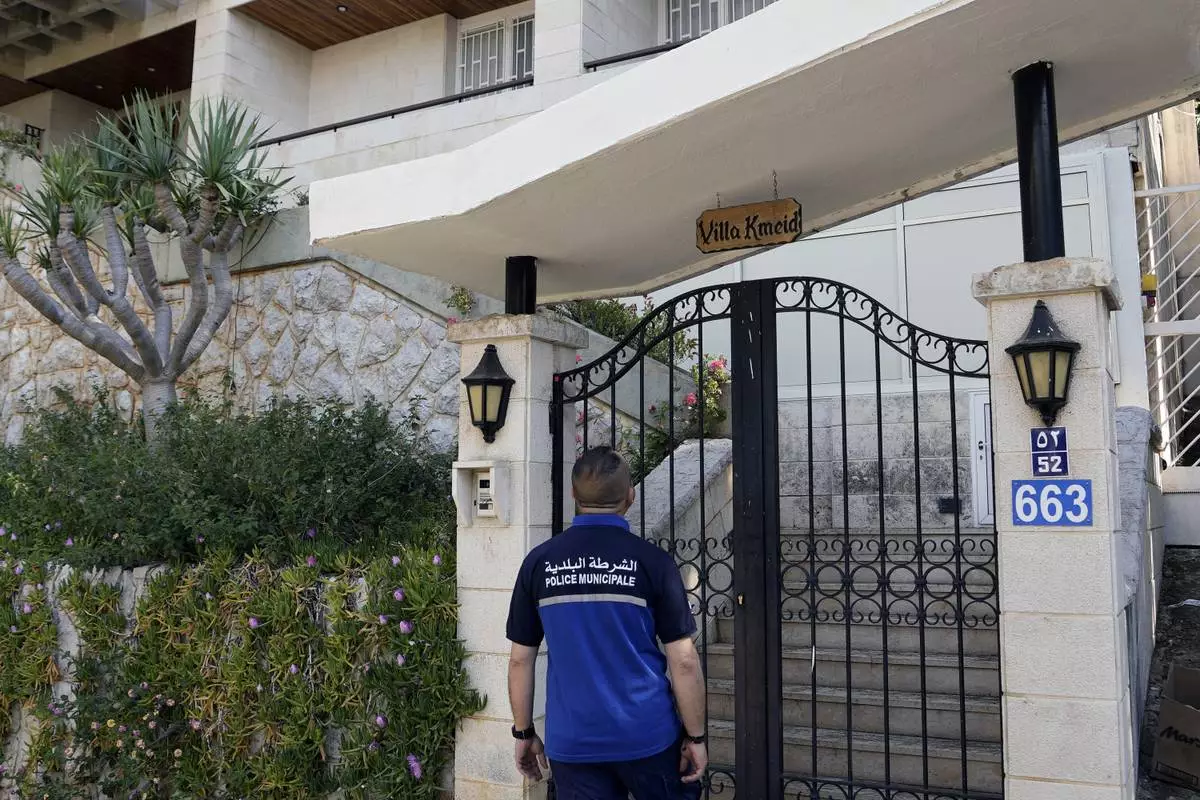
A municipal police officer stands outside a villa where the Lebanese money changer Mohammad Srour, 57, was found tortured and killed in Monte Verdi neighborhood of Beit Meri, Lebanon, Tuesday, April 16, 2024. Lebanon’s interior minister alleged Wednesday that the mysterious abduction and killing of a Hezbollah-linked Lebanese financier in a villa on the edge of a quiet mountain resort town earlier this month was likely the work of Israeli operatives. (AP Photo/Hassan Ammar)
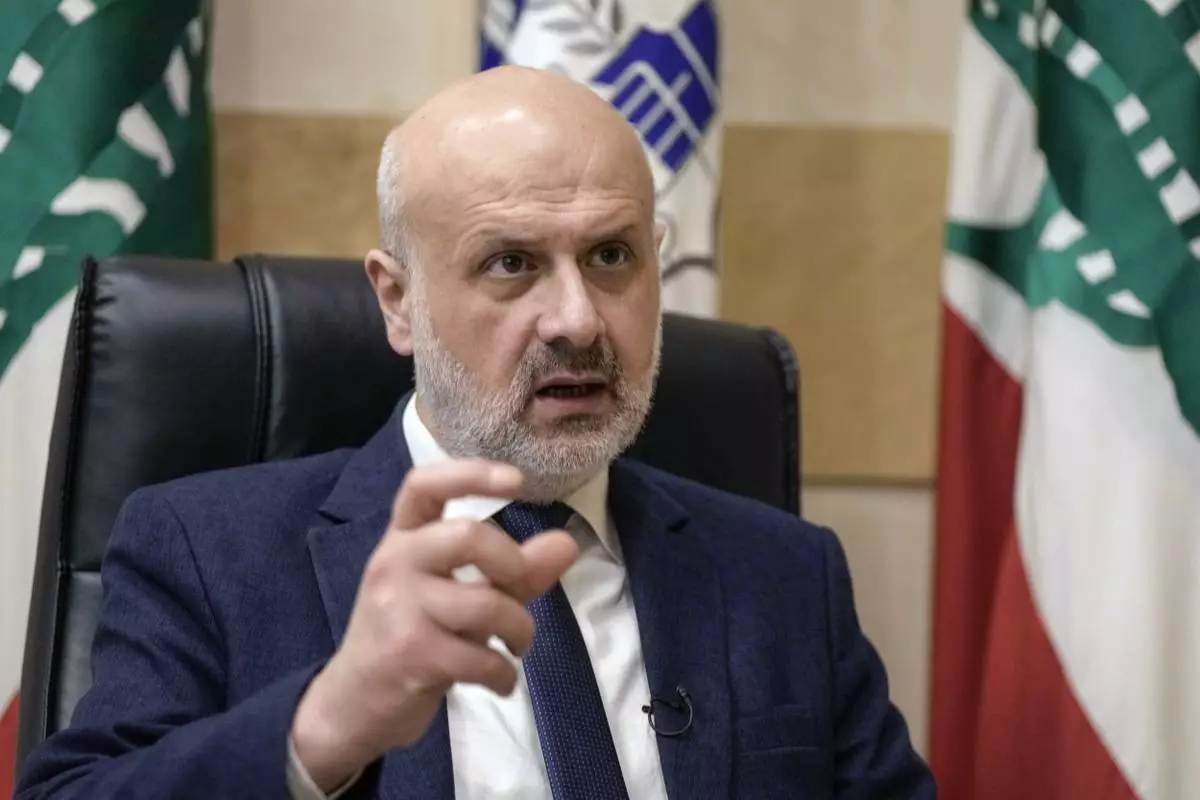
Lebanese Interior Minister Bassam Mawlawi, speaks during an interview with the Associated Press at the interior ministry in Beirut, Lebanon, Tuesday, April 16, 2024. Lebanon’s interior minister alleged Wednesday that the mysterious abduction and killing of a Hezbollah-linked Lebanese financier in a villa on the edge of a quiet mountain resort town earlier this month was likely the work of Israeli operatives. (AP Photo/ Hassan Ammar)

In this grab taken from video, mourners carry the coffin of Lebanese money changer Mohammad Srour, 57, who was found tortured and killed inside a villa in Monte Verdi neighborhood of Beit Meri, during his funeral procession in Labweh village, near the border with Syria, northeast Lebanon, Thursday, April 11, 2024. Lebanon’s interior minister alleged Wednesday that the mysterious abduction and killing of a Hezbollah-linked Lebanese financier in a villa on the edge of a quiet mountain resort town earlier this month was likely the work of Israeli operatives. (AP Photo)
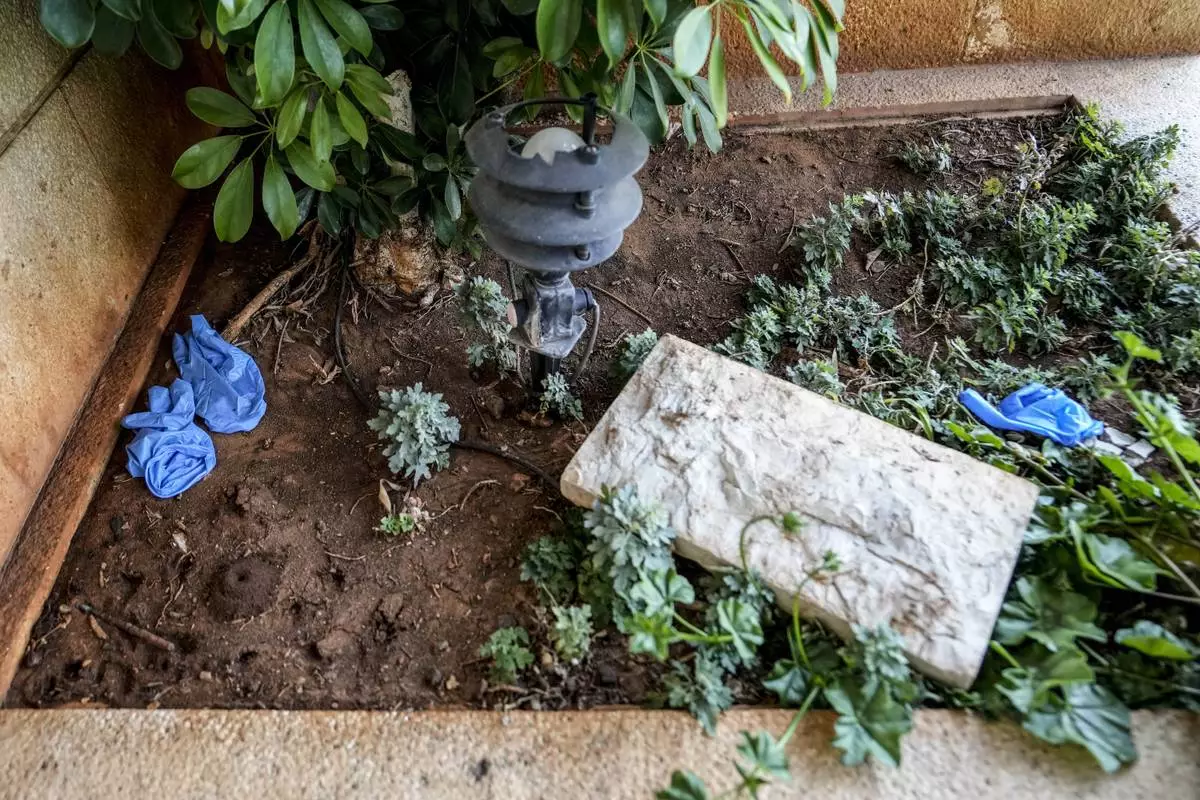
Medical gloves sit outside a villa where money changer Mohammad Srour, 57, was found tortured and killed in Monte Verdi neighbourhood of Beit Meri, Lebanon, Tuesday, April 16, 2024. Lebanon’s interior minister alleged Wednesday that the mysterious abduction and killing of a Hezbollah-linked Lebanese financier in a villa on the edge of a quiet mountain resort town earlier this month was likely the work of Israeli operatives. (AP Photo/Hassan Ammar)
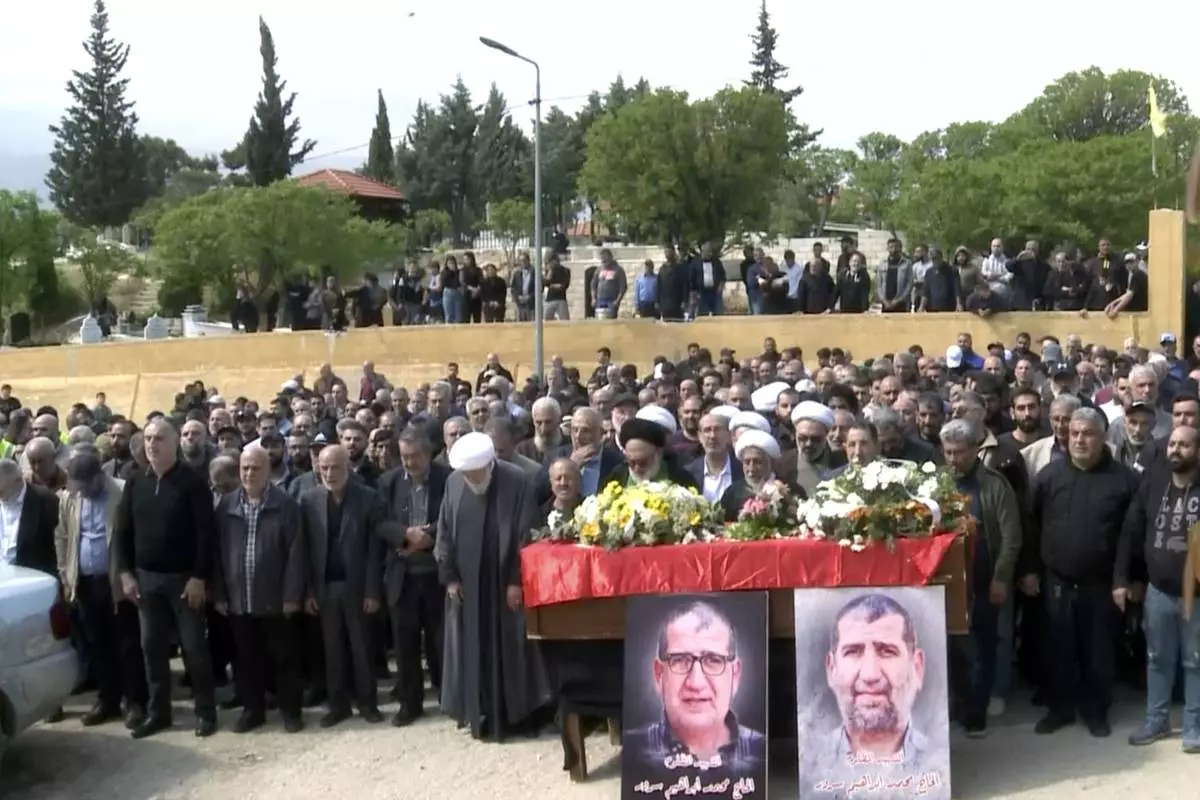
In this grab taken from video, mourners pray over the coffin of Lebanese money changer Mohammad Srour, 57, who was found tortured and killed inside a villa in Monte Verdi neighborhood of Beit Meri, during his funeral procession in Labweh village, near the border with Syria, northeast Lebanon, Thursday, April 11, 2024. Lebanon’s interior minister alleged Wednesday that the mysterious abduction and killing of a Hezbollah-linked Lebanese financier in a villa on the edge of a quiet mountain resort town earlier this month was likely the work of Israeli operatives. (AP Photo)
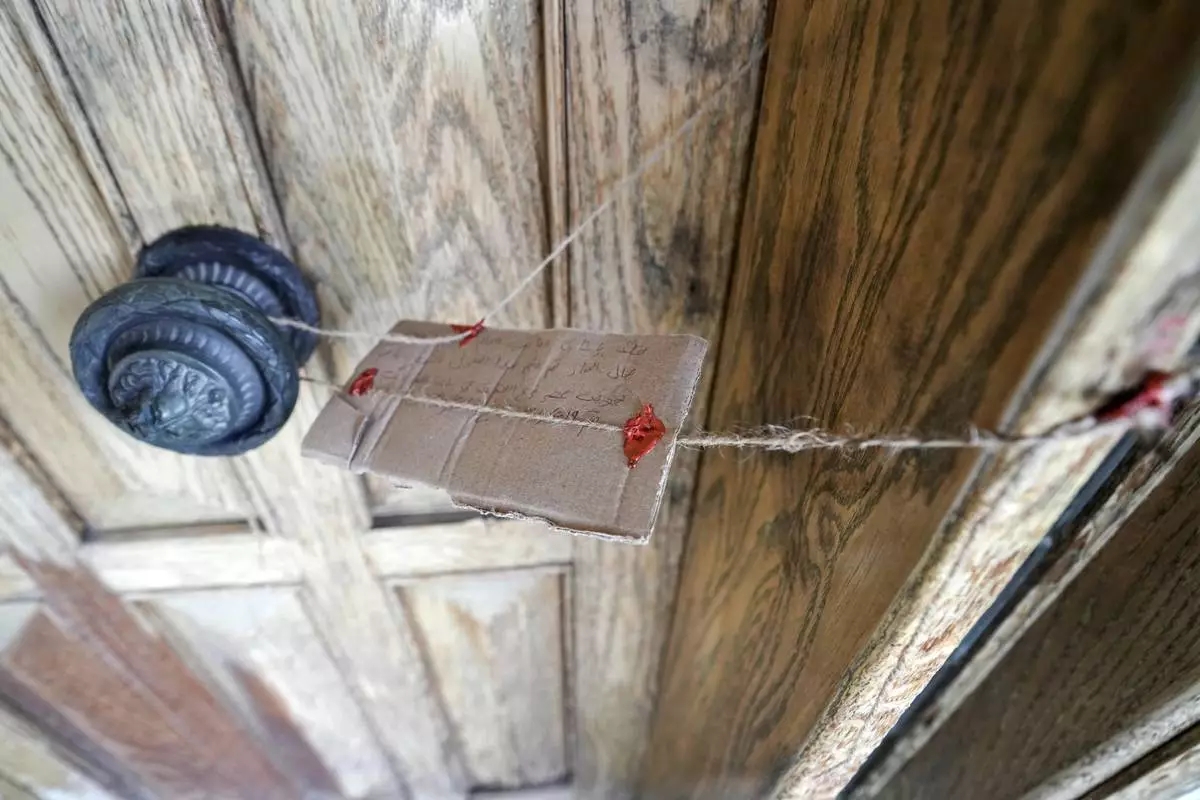
Lebanese authorities sealed the main door of a villa where money changer Mohammad Srour, 57, was found tortured and killed in Monte Verdi neighbourhood of Beit Meri, Lebanon, Tuesday, April 16, 2024. The mysterious abduction and murder of a United States-sanctioned Lebanese money changer in a three-story villa on the edge of a quiet mountain resort town overlooking Beirut was most likely the work of Israeli operatives, Lebanon's interior minister said Wednesday. (AP Photo/Hassan Ammar)

Municipal police officers patrol outside a villa where the Lebanese money changer Mohammad Srour, 57, was found tortured and killed in Monte Verdi neighbourhood of Beit Meri, Lebanon, Tuesday, April 16, 2024. Lebanon’s interior minister alleged Wednesday that the mysterious abduction and killing of a Hezbollah-linked Lebanese financier in a villa on the edge of a quiet mountain resort town earlier this month was likely the work of Israeli operatives. (AP Photo/Hassan Ammar)




